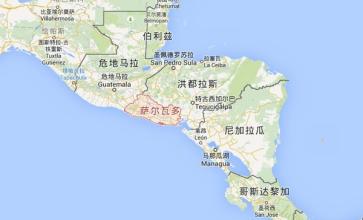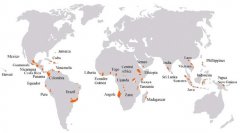Introduction of coffee culture and growing environment in Tanzania!
Coffee beans in Tanzania are of extraordinary quality. They are produced in the Mohi district near Mount Kilimanjaro. The mountains with a height of 3,000 to 6,000 feet are the most suitable areas for growing coffee. The fertile volcanic ash gives the coffee here a strong texture and soft acidity. It exudes delicate aromas and contains aromas of wine and fruit, making people taste endless aftertaste. After drinking Kilimanjaro coffee, I always feel a soft and mellow earthy smell around my mouth. Coffee gourmets often use words such as "wild" or "wild" to describe it. It can be said that pure Kilimanjaro coffee is "the most African coffee". Kilimanjaro AA is the highest grade of beans, its grains are full, pure flavor, rich and refreshing, all aspects of quality are good. It is usually more acidic than Kenya coffee and evenly stimulates the taste buds in the middle and sides of the back of the tongue, feeling a bit like the sour taste of tomato or soda. After moderate or more moderate baking, it has a strong aroma, then grind it into a fine powder, soak it in a pot of boiling water, and invite friends to sit around and taste it. The famous coffee brands in Tanzania are Africafe, Tanica Cafe, Kilimanjaro and so on, and their quality is much better than the Nestle coffee we often drink. Tanzanian coffee has long been loved by Europeans and has joined the ranks of famous products. Europeans give Tanzanian coffee the nickname "coffee gentleman", and Chinese coffee connoisseurs call it the "coffee swordsman" with the mocha of the "King of Coffee" and the "Lady of Coffee".
Coffee is one of the main cash crops in Tanzania, ranking fourth after cotton, tobacco and cashew nuts, mainly sold to Italy, Japan and the United States. Coffee exports play an important role in the national economy of Tanzania. Tanzania's main coffee-producing area, located at the foot of Mount Kilimanjaro, is rich in volcanic soil. Some coffee trees are more than 100 years old. Coffee was first introduced and planted by Christians from Kenya. Coffee trees must be carefully cared for, weeded, fertilized, and old branches must be cut off so that new branches can grow to maintain the quality of coffee beans. The processing plant is located in a nearby town at the foot of the mountain, making it easy to handle coffee beans nearby. Many of the farm owners' families have lived here for generations of immigrants, including Indians, Scandinavians, British, and, of course, locals, but most of them are small farms. however, the managers of farms and processing farms are mostly local people. Labor in Tanzania is cheap, so much of the work of pruning and maintaining coffee plantations in Tanzania depends on manual processing rather than machines. During the coffee growing season, the job of coffee workers is to manually check to remove the leaves of some sick or growing insects. Coffee processing in Tanzania is highly dependent on labor, but it also brings jobs to locals and increases household income. Workers earn their wages by harvesting the amount of coffee fruit, and small farm women use their hand-made sacks to bring coffee fruit to the farm to calculate the money.
The coffee beans produced here are all exported from Kilimanjaro, but apart from Mount Kilimanjaro, there are several major coffee-producing areas throughout Tanzania, there are more small farms in other areas, and most small farms also have a planting area of several hundred mu. Some have their own washing equipment and drying farms, but graded treatment still has to go through large-scale treatment plants. Tanzania has considerable historical experience in growing coffee, and even small farms can handle good quality coffee beans.
Drinking Tanzanian coffee, especially the small round bean peaberry, is always impressive. Coffee is like the simple, frank and enthusiastic national character of Tanzania. Its refreshing acidity and medium mellowness complement sweet citrus and floral aromas. This coffee tastes great whether it's a hot drink or iced coffee. With oranges or berries, it can show its bright flavor. You can experience that different ethnic groups produce different coffee flavors, while the same land is pregnant with coffee trees and people at the same time.
Source: Chinese community in Tanzania
Important Notice :
前街咖啡 FrontStreet Coffee has moved to new addredd:
FrontStreet Coffee Address: 315,Donghua East Road,GuangZhou
Tel:020 38364473
- Prev

El Salvador Coffee--Once the world's fourth largest coffee producer El Salvador Coffee
Many friends don't know El Salvador, a country located in northern Central America. Honduras to the north, the Pacific Ocean to the south, Guatemala to the west and northwest, and the Gulf of Fonseca to the east. The smallest and most densely populated country in Central America. Terrain to mountains, plateau-based, volcanic, Santa Ana active volcano elevation of 2,385 meters, the highest peak for the country; north
- Next

Tanzania: Kilimanjaro coffee taste and its main origin
Tanzania: Kilimanjaro coffee flavor taste characteristics: soft acidity, attractive aroma. Coffee from Tanzania has long been loved by Europeans and is among the most famous products. Europeans give Tanzania a nickname for coffee gentleman, and Chinese coffee connoisseurs call it the coffee swordsman with the coffee king Blue Mountain and the coffee lady's mocha. Tansan
Related
- Does Rose Summer choose Blue, Green or Red? Detailed explanation of Rose Summer Coffee plots and Classification in Panamanian Jade Manor
- What is the difference between the origin, producing area, processing plant, cooperative and manor of coffee beans?
- How fine does the espresso powder fit? how to grind the espresso?
- Sca coffee roasting degree color card coffee roasting degree 8 roasting color values what do you mean?
- The practice of lattes: how to make lattes at home
- Introduction to Indonesian Fine Coffee beans-- Java Coffee producing area of Indonesian Arabica Coffee
- How much will the flavor of light and medium roasted rose summer be expressed? What baking level is rose summer suitable for?
- Introduction to the characteristics of washing, sun-drying or wet-planing coffee commonly used in Mantenin, Indonesia
- Price characteristics of Arabica Coffee Bean Starbucks introduction to Manning Coffee Bean Taste producing area Variety Manor
- What is the authentic Yega flavor? What are the flavor characteristics of the really excellent Yejasuffi coffee beans?

